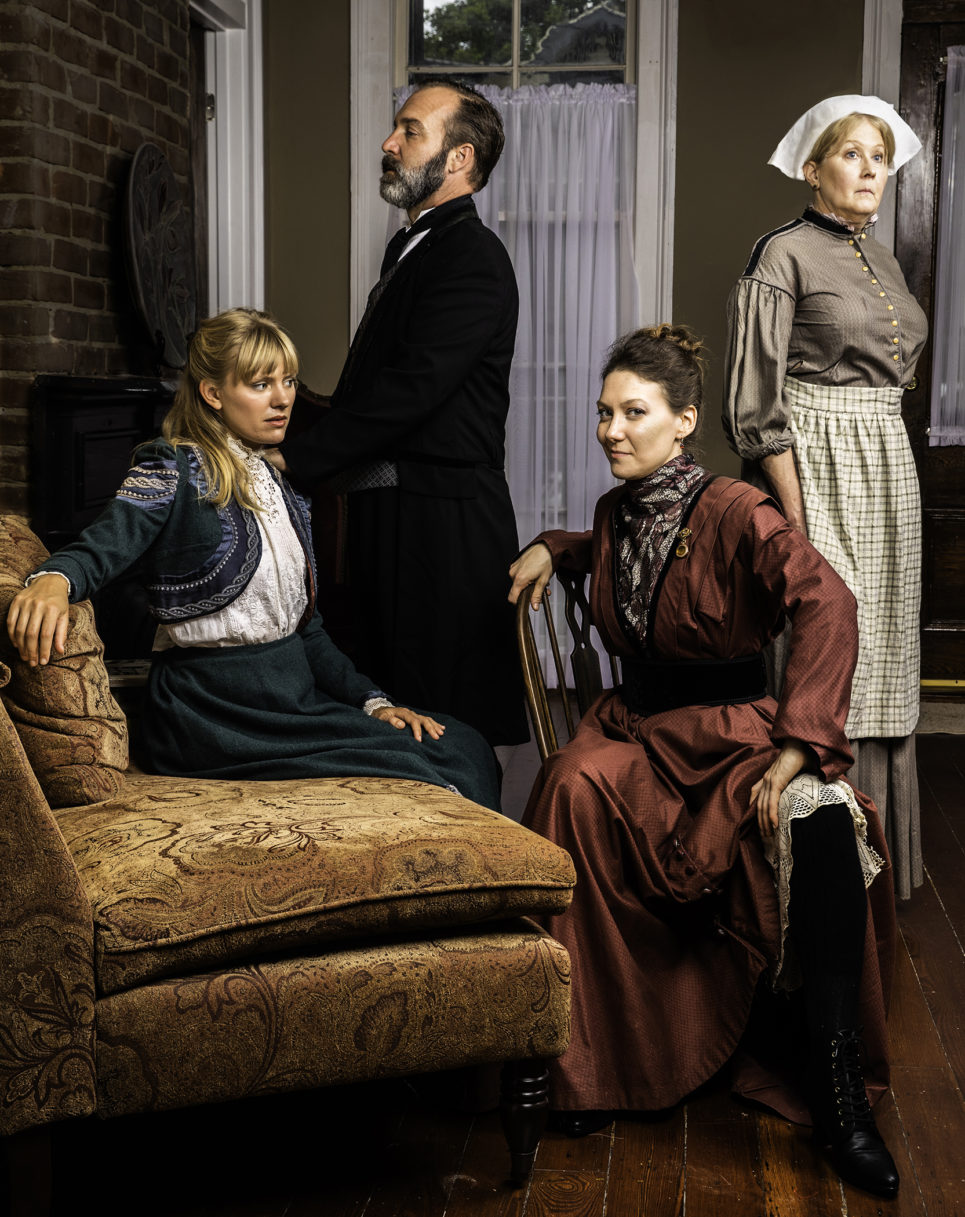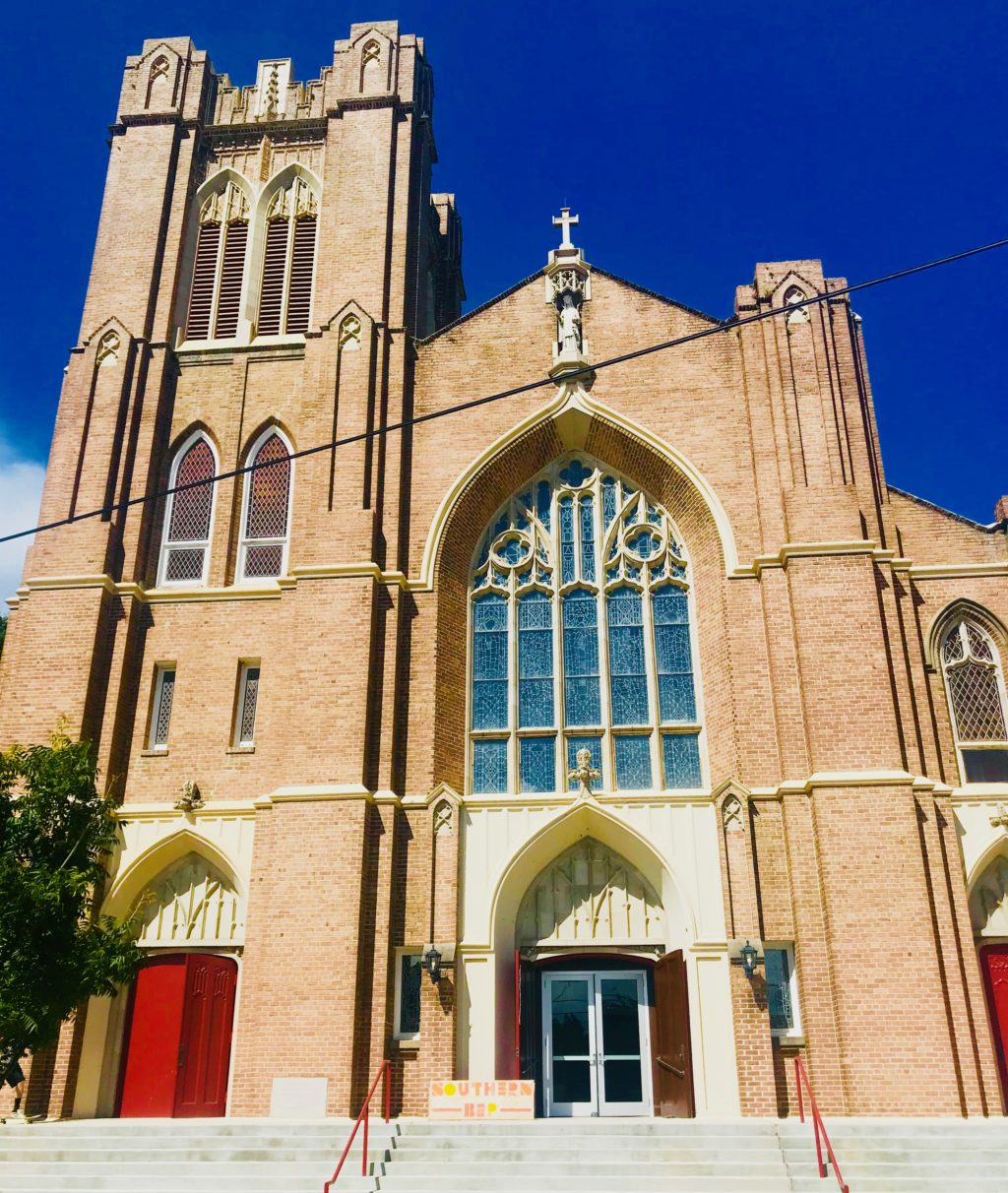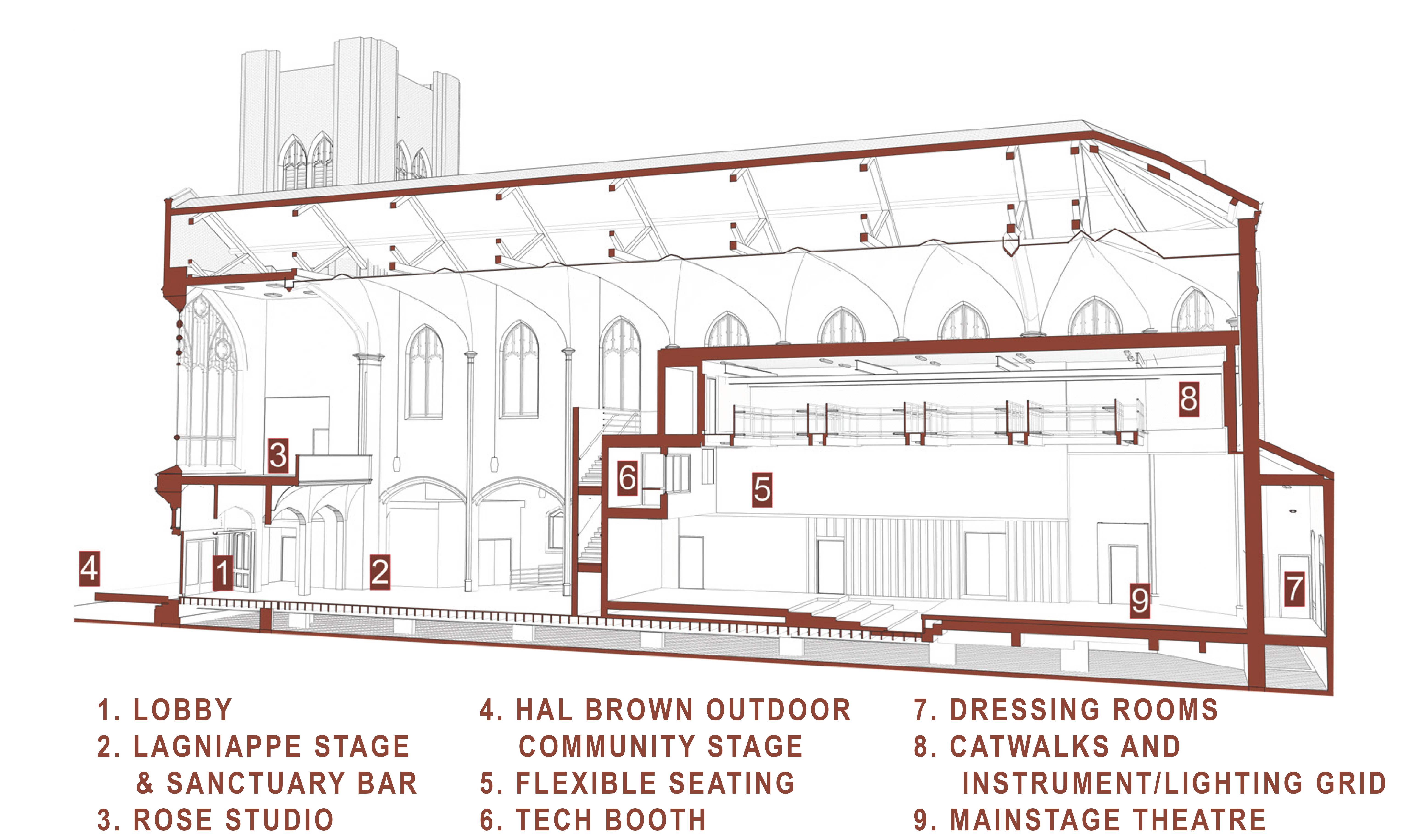Since 1986, Southern Rep Theatre has been producing original and classic plays that speak to the depth and diversity of New Orleans and its culture. Now, after six years without a permanent home, Southern Rep has found one. The former Saint Rose de Lima Church on Bayou Road has been transformed into a 13,400-square foot theater complex, complete with a 125-seat main stage, a cabaret stage, even an outdoor space. Recently, we sat down with artistic director Aimee Hayes to talk about Southern Rep’s roots in the past and its projections for the future.

Southern Rep artistic director Aimee Hayes (Photo: Southern Rep)
I know that you are very glad to have a home.
You mean, how does it feel to have a home at last after six years on the road? It feels so satisfying and also a little disorienting because we’ve been in survival mode — making art, moving from place to place, finding refuge here and there. To finally be in our new own home, our permanent forever home, feels so good. But it’s also, is this real? We keep pinching ourselves. Is this real? Yes. It is.
Is it going to change the way you do things?
At Canal Place, which we loved, one of the challenges is we weren’t part of any kind of neighborhood. And one of the beauties of actually being on the road, while it was challenging, we got to meet all sorts of people from all over New Orleans as we moved from place to place. And that cemented, for all of us at the company, that we wanted to be in a neighborhood. We want to be somewhere where we can not only interact with that neighborhood, but bring good things to the place that we are. That kind of permanence allows us to really gain more and offer more opportunities, more programs for all of the constituents and audience members and friends that we have in New Orleans.
You’re a cultural focal point for your new neighborhood. And it’s a very happening neighborhood.
It truly is. Bayou Road has a long and storied and deep history of culture and heritage. And we are just so humbled to be part of the next age of that. I think the future is open as to what we’re going to be bringing to that.
Southern Rep started out more than 30 years ago as something of a maverick, in that it was experimental. It promoted emerging voices and emerging playwrights. Now, it’s become in a way a kind of a grande dame of theater in New Orleans. So, has your mission changed? Is it evolving?
I’m kind of loving that you called us a grande dame. That’s so funny. I guess when you’ve been around for over 30 years, you become somewhat of an institution. In so many ways, we still feel like a young company. We’re always working on how we can improve things or what’s the next thing to do? How do we explore or open up this part of art to a different community? And I think because of that, and because of the incredible staff we have and the board we have, everything is always fresh. I think we’re always pushing the boundaries.
So if you are a grande dame, it will be an eccentric one.
I would like to be the strange old aunt. Maybe I’m speaking about myself more so than Southern Rep. Yeah. I’m still giggling about it.
Tell me what you think about New Orleans as a theater town.
I think New Orleans is on the verge of really great things. I think we’ve been on the verge of great things for a while. One of the greatest challenges is not having a space that theater companies can use, and we lose spaces rather than gaining spaces. And one of the things that we’re really excited about is our stage, which is an opportunity for up-and-coming companies and different kinds of artists to have a platform.
The theater community here has been through so much. I think that we are a very connected and very close community, and I love that there are so many different kinds of theater makers in New Orleans. The one thing that I am always thinking we have to work on — and we focus on this a lot as a staff and as a company — is how do you change the theater ecology of New Orleans? How do you get New Orleanians to come to the theater? And one of the reasons why our space is kind of innovative is because we want to start outside. Everything everybody does in New Orleans is outside. Even though it rains all the time or it’s baking hot, we want to be outside. So, the outdoor stage gives us an opportunity to say, hey, come watch this theater event or this puppet show or this dance thing. How do we get people then to come inside is kind of the next step. And then come to a main stage show. I want theater to be on every New Orleanian’s event menu. “Honey, what are we doing? Let’s go see theater.”

‘A Doll’s House, Part 2’ opens the Southern Rep season in its new, permanent home. (Photo: Southern Rep)
New Orleanians love costuming and pageantry and theater, but they’re kind of used to doing it themselves in the streets as opposed to an audience.
I think that’s right. I think that’s why our soap opera Debauchery has been running for eight years, because the audience can yell back at the stage, which is amazing. And Debauchery will be returning to the Southern Rep stage in October. So, for all those interactive theater watchers, we have everything that you need.
New Orleans has a lot of creativity and richness that sometimes flies under the radar. Getting people to understand how much we have to offer, particularly with companies like Southern Rep, can be a challenge.
I agree. There’s so much to do in New Orleans. I get it. I mean, every weekend, it’s like ‘oh my gosh. Are you going to go to this festival or this musical event and classical music?’ There’s everything to do here. So, I get that it’s a challenge.

Southern Rep’s new home is in the former St. Rose de Lima Church on Bayou Road (Photo: Southern Rep)
How much does New Orleans factor in what you choose to do?
Our primary work is our main stage work, and that is usually a mix of regional and local premieres, as well as producing new plays or new voices from New Orleanians, but not exclusively. This year, for example, we have a new play about Mahalia Jackson by Troi Bechet, and we have a new holiday musical from Leslie Castay and Ian Hoch, and those are all fabulous local writers.
We also think education is really important to a theater community. You’re not done as an actor, as a writer, as a director. I’m learning all the time. For writers, we try to offer as many programs and opportunities for them to be involved. Our 4D program brings together directors, dramatists, and dramaturgs to get together over a year and write a play together. And we think that that intensive process has really benefited the playwrights we’ve worked with. Coming up in the new space will be a return to ‘6 by 6’. When the city started coming back in 2007, one of the things we saw is that writers were saying they wanted to write, but they weren’t writing. So, we created ‘6 by 6’ to say once a month, here. Write a 10-minute play. It doesn’t matter if you do anything else this month, but get to writing. Get moving.
New Orleans always is part of everything that we do. I’m a New Orleanian. People who work at Southern Rep, the board, love the city. They wouldn’t be here unless they did, and the work that we do often reflects issues that are challenging in the city. We like to have dialogue. We like to mix things up. Sometimes we do plays that are tough, but we think that that’s probably good for New Orleans and good for the community.
How do you choose your works?
I have to really like a play first. I never pick a play because it’s an issue play. I have to really like what the playwright’s saying or doing, or, how it is challenging us, or, how it is speaking to us. Also, we want to support the artists in the city. Sometimes I pick a play because that’s a great role for an actress, or this is a tour de force for this kind of person.
I think it’s really important to think about who you have in your community who can benefit from that work. When we did Colossal, that was about a football team. It was an opportunity to get a bunch of guys together. They trained for three months to get on that stage. And we love football in this town and we were able to have an actor who was in a wheelchair and challenged by that. And we were able to tell his story beautifully. I think we’re always looking for things that are going to include everybody in the community.

The new space will have a main stage theater, cabaret theater and outdoor space. (Photo: Southern Rep)
You’re an actress as well. Has that informed your job as a producer, director, artistic leader?
I actually have never cast myself in anything that I’ve done. Either it’s been a director or a writer who has said, ‘I want to do this. Will you do it?’ I did not cast myself as Blanche in Streetcar or as Hannah in Night of the Iguana. Those were all the directors saying, ‘would you consider doing this,’ and me saying, ‘I’m scared.’ And then going ahead and doing it. I’m waiting for someone to ask me to do something now. No one’s asked in a while, so I haven’t been on stage in three years.
What’s the one aspect of New Orleans that you think would make a great play that hasn’t been written yet?
I love plays about New Orleans politics, and I think that those plays always interest me. I would love to see historic plays. We’re actually working on a play that’s being developed over the next year and a half about Bayou Road, and last year we spent some time recording interviews with people who are from Bayou Road, people who are associated with Saint Rose de Lima Church. So, we have all of these stories that are now being crafted into a play by playwright Pamela David Noland, who’s worked with us before. And I’m really excited to see the story that she tells about the 400 years of history that we know of on Bayou Road and how that interacts with today’s life on Bayou Road.
You know where you’ve come since 2007. Where do you hope to be seven years from now?
We’re actually going to be doing kind of a strategic planning and a visioning with the staff and board over the next year. And one of the things that I want to see come out of that is about the audiences. I want Southern Rep, the building itself, to be a hub. A place where people can come and have their lunch and coffee and come and do their homework or hang out or meet a friend and also, let’s go see that show. That it’s very integrated into the entire artistic community. Not just the theater community, but the entire artistic community feels like it has a home. That’s one thing. I think place is really important.
The second thing is, I always want more, and I’m always slightly dissatisfied. I think nobody’s harder on Southern Rep and what we do than I am. I’m always thinking, how can we be better? What’s the next thing? How can we improve? And I would really like to just see us investing more in local artists and helping them be the best that they can be. And also, with Southern Rep, along with the other theater companies in New Orleans, really making New Orleans a hub for theater in the United States. That’s the big, super, super goal.
You’ve got some new initiatives coming up, like your wellness initiative.
Yeah. Care for Creatives is an initiative with musician clinics. It is well-being programming for artists, creatives. They happen throughout the week at Southern Rep, and we’re really excited to turn over the space to that kind of thinking and care taking.
We’re also expanding our arts education. We have a free after-school program for the Bayou Road neighborhood, and I think engagement-wise, we’re always looking for ways to partner. We’ve had so many partners in the city. I don’t know if there are that many people we haven’t partnered with. And to continue those and strengthen those and really ask, what do we give to each other? New Orleans only grows and flourishes by how we are connected to each other. That’s the beauty of the city.
What’s the timeline for the new theater?
The steps that we’re taking right now to be in this space are really about housewarming our space for the next three months. We’re looking to have a grand opening in January of 2019. And we want everybody to come. This is the community space, you know? We’re no longer renting a space somewhere for a limited amount of time. This is everyone’s space to come into and we’re inviting everyone to come in and be a part of helping us make our home. To be able to ask that, to invite people to your own home, it’s unparalleled, unequaled and it just makes my heart burst with joy.
Southern Rep begins its 2018 season with a play that, like the theater itself, is about second acts: A Doll’s House, Part 2 takes up where Ibsen left off. Performances start October 3. For more information on tickets, the play, the new season and the new theater, go to southernrep.com.
 NOLAbeings Multimedia artist Claire Bangser created NOLAbeings as a portrait-based story project that marries...
NOLAbeings Multimedia artist Claire Bangser created NOLAbeings as a portrait-based story project that marries...  Voodoo in New Orleans: Reviving history: New Orleans fortune telling This article takes a deep dive into the history of Voodoo in New Orleans, its hybridization with Catholicism, and its present-day place in the city's culture. The author visits fortune-tellers in the French Quarter, using their guidance as a tool for introspection rather than a deterministic predictor of the future. Through her experiences in New Orleans, the author feels a mystical connection to both the past and the future.
Voodoo in New Orleans: Reviving history: New Orleans fortune telling This article takes a deep dive into the history of Voodoo in New Orleans, its hybridization with Catholicism, and its present-day place in the city's culture. The author visits fortune-tellers in the French Quarter, using their guidance as a tool for introspection rather than a deterministic predictor of the future. Through her experiences in New Orleans, the author feels a mystical connection to both the past and the future. 